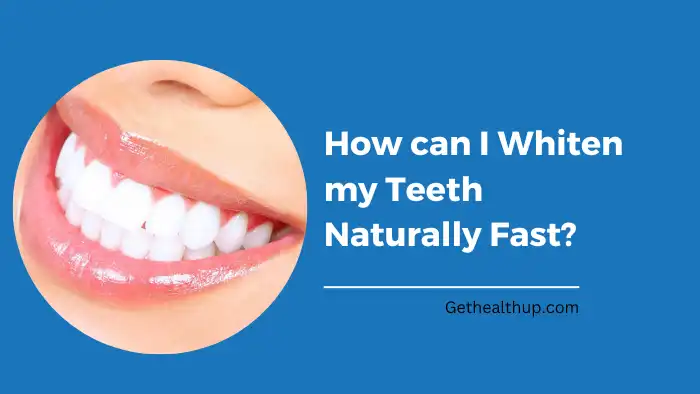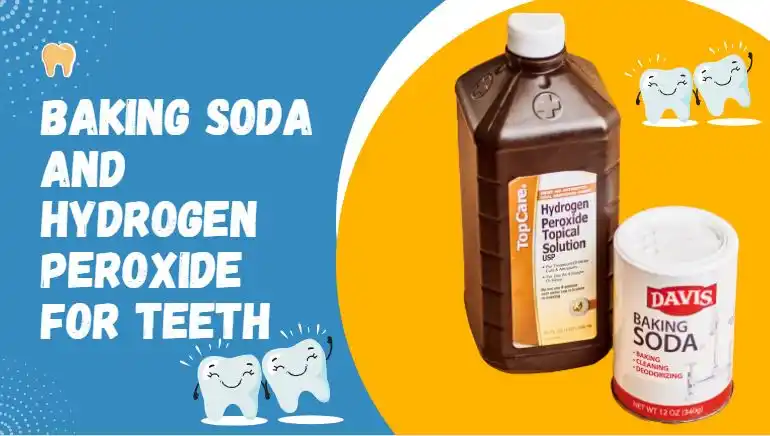While there is no guaranteed way to whiten teeth naturally fast, some home remedies may help to brighten your smile over time.
These include brushing with baking soda, using hydrogen peroxide, oil pulling with coconut oil, applying apple cider vinegar, and eating crunchy fruits and vegetables (source: Healthline).
However, it is important to note that natural remedies may not be as effective as professional treatments and may take longer to see results.
It is also important to use caution when using natural remedies, as some may cause damage to tooth enamel or irritate the gums if used improperly.
Brush with Baking Soda
Baking soda is a natural whitening agent that has been used for centuries. It has mild abrasive properties that can help remove surface stains on teeth and also create an alkaline environment in your mouth, which can prevent the growth of bacteria that causes cavities and bad breath.
To use baking soda, mix a small amount with water to make a paste, and brush your teeth with it for 2 minutes twice a week.
Oil Pulling
Oil pulling is an ancient Indian practice that involves swishing oil in your mouth for a few minutes to remove toxins and bacteria.
Coconut oil is an excellent choice for oil pulling because it contains lauric acid, which can help reduce inflammation and prevent tooth decay.
To oil pull, put a tablespoon of coconut oil in your mouth and swish it around for 15-20 minutes before spitting it out.
Pros and Cons:
Pros
- Affordable: Natural teeth whitening methods are often much more affordable than professional dental treatments.
- Safe: Most natural teeth whitening methods are safe and do not contain harmful chemicals that can damage tooth enamel or cause sensitivity.
- Easy to use: Many natural teeth whitening methods can be easily incorporated into your daily oral care routine.
- Good for oral health: Some natural teeth whitening methods, such as oil pulling and eating crunchy fruits and vegetables, can also improve overall oral health.
- Environmentally friendly: Natural teeth whitening methods are often environmentally friendly, as they do not require the production of plastic packaging and can be made from natural ingredients.
Cons
- Limited effectiveness: Natural teeth whitening methods may not be as effective as professional dental treatments for more severe discoloration.
- Requires consistency: Consistency is key when using natural teeth whitening methods, and results may not be noticeable without regular use.
- Slow results: Natural teeth whitening methods may take longer to show results compared to professional dental treatments.
- Not suitable for all stains: Natural teeth whitening methods may not be effective on certain types of stains, such as those caused by antibiotics or trauma.
- Risk of overuse: Overuse of natural teeth whitening methods, such as baking soda or hydrogen peroxide, can damage tooth enamel and cause sensitivity. It’s important to use these methods in moderation and under the guidance of a dentist.
Eat Fruits and Vegetables
Eating crunchy fruits and vegetables like apples, carrots, and celery can help scrub away plaque and stains on teeth.
They also contain high amounts of fiber, which can stimulate saliva production and wash away bacteria and food particles in your mouth.
Strawberries and pineapples are also good choices because they contain natural enzymes that can help whiten teeth.
Use Hydrogen Peroxide
Hydrogen peroxide is a characteristic fading specialist that can really brighten teeth. It works by separating the synthetic bonds that cause stains on teeth.
To use hydrogen peroxide, mix equal parts of water and 3% hydrogen peroxide, swish it around in your mouth for 30 seconds, and then spit it out. Do this once a day for a week, then reduce the frequency to once a week.
Limit Staining Foods and Beverages
Some foods and beverages can cause staining on teeth. Limiting your consumption of these foods can help prevent discoloration.
Coffee, tea, red wine, and dark-colored fruits like berries are common culprits. If you do consume these foods and beverages, drink water afterward or brush your teeth to minimize staining.
Try Sea Salt Lemon Juice and Toothpaste to Whiten Your Teeth
Mixing sea salt, lemon juice, and toothpaste is a popular natural method for teeth whitening. Sea salt has mild abrasive properties that can remove surface stains, while lemon juice acts as a natural bleach.
Try Apple Cider Vinegar and Water
Apple cider vinegar has acetic acid, which can remove surface stains and kill bacteria in the mouth.
However, using undiluted apple cider vinegar can erode tooth enamel. It’s recommended to mix one part vinegar with two parts water and rinse for 30 seconds, then brush with regular toothpaste.
Try Powdered Milk And Toothpaste
Mixing powdered milk and toothpaste to create a paste is a natural teeth-whitening remedy. The lactic acid in the milk can help remove stains and strengthen tooth enamel.
However, the effectiveness of this method is limited, and it may not work for everyone. Additionally, the sugar content in milk can lead to tooth decay if not properly rinsed.
Conclusion
These natural teeth whitening methods can help you achieve a brighter and healthier smile.
However, it’s important to note that natural remedies may not work for everyone, and some people may require professional dental treatments for more severe discoloration to continuously talk with your dental specialist prior to attempting any new brightening techniques.
Frequently Asked Questions
Is it safe to use baking soda to whiten teeth?
Yes, using baking soda to whiten teeth is safe as long as it is done in moderation. Baking soda can be abrasive, so it’s recommended to use it only twice a week.
Can oil pulling whiten teeth?
Yes, oil pulling can help whiten teeth by removing toxins and bacteria that can cause discoloration.
How long does it take to see results from natural teeth whitening methods?
The consequences of normal teeth brightening strategies can change contingent on the strategy utilized and the seriousness of the stains.
Some people may see results in a few days, while others may take several weeks to see noticeable improvement.
Is it okay to use hydrogen peroxide to whiten teeth?
Yes, hydrogen peroxide is safe to use to whiten teeth as long as it is properly diluted. It’s important not to swallow it, and to rinse your mouth thoroughly after use.
Can eating certain foods help whiten teeth naturally?
Yes, eating crunchy fruits and vegetables like apples, carrots, and celery can help scrub away surface stains on teeth.
Strawberries and pineapples are also good choices because they contain natural enzymes that can help whiten teeth.
How often should I brush my teeth with baking soda?
It’s recommended to brush your teeth with baking soda only twice a week, as using it too often can damage tooth enamel.
Can natural teeth whitening methods be used on crowns and veneers?
No, natural teeth whitening methods are not effective on crowns and veneers. These dental restorations are made of materials that do not respond to bleaching agents.
Can I use lemon juice to whiten my teeth naturally?
No, using lemon juice to whiten teeth is not recommended as it can erode tooth enamel and cause more harm than good.
How long should I oil pull to whiten my teeth?
It’s recommended to oil pull for 15-20 minutes each day to help whiten teeth and improve overall oral health.
Is it possible to over-whiten teeth naturally?
Yes, over-whitening teeth naturally can cause tooth sensitivity and even damage tooth enamel.
It’s important to follow the recommended guidelines for natural teeth whitening methods and to consult with a dentist if you have any concerns.

A Blogger, Author and Researcher! Gohar Aalam is recognized as a full-time blogger for Health and Tech Niches. I’m a Fountainhead of Gethealthup.com, will provides high quality knowledge.








